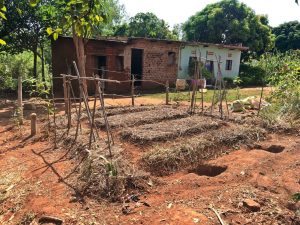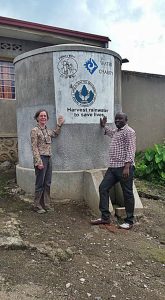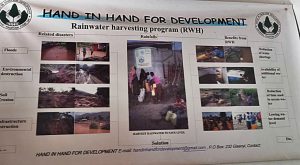This project is made possible through the partnership of WATER CHARITY and the NATIONAL PEACE CORPS ASSOCIATION. ![]()
This project has been completed. To read about the conclusion, CLICK HERE.
The second training of our Permagarden Training Initiative – Worldwide will take place in February 2018. Peter Jensen will train representatives of Hand in Hand for Development (a Rwandan NGO) and other NGOs from the Gisenyi area of Rwanda, with his Terra Firma Permagardens for Empowerment and Resilience course.
Here is an outline of what we intend to accomplish in this monumental initiative to spread permaculture technology across the globe.

Trainer: Peter Jensen, Agroecology and Permagarden Training Specialist. Peter previously completed the Peace Corps Permagarden Training – Swaziland.
What: Four-Day Permagarden Creation and Outreach Training
Where: Gisenyi, Rwanda
When: January 21-30, 2018, including preparation, follow-up, and evaluation
Who: Thirty Trainees from the Gisenyi area, including Hand in Hand for Development outreach workers and staff, and representatives of other Rwandan and Ugandan NGOs, The training is being arranged and hosted by Niyitegeka Patient, Coordinator at Hand in Hand. The patient also serves as Country Director for Friendly Water for the World and previously coordinated our jointly sponsored Gisenyi Rainwater Catchment System & Ferro-Cement Tank Training Program – Rwanda with that organization.

Terra Firma Permagardens are family-oriented, nutrition-focused, climate-smart, organic gardens. They serve as the missing link between seasonal agricultural production and the daily, nutrient-dense, food consumption needs of marginalized rural, urban and peri-urban families.
In order to achieve daily nutrition security of mother, child and extended family, agricultural techniques must be ‘climate-smart’. This concept forms the key pillars of any Permagarden Training: Adaptation, Mitigation, and Intensification.
These goals have a number of critical action steps which are small and doable following the Rule of CLOSE so as to achieve attitude and eventual behavior change amongst those directly trained and those who shall be trained within the community outreach program that will follow the training via the trainees and their respective organizations. These actions from the basis of the Terra Firma Method: Assess, Capture, Protect, Produce, Manage.
All ‘Terra Firma’ actions are close to the home, locally sourced, organic, small and easy so as to achieve a “53-week” harvest cycle by even the most marginalized individuals. This is achieved through the rational, step by step, water management strategy whereby the subsoil becomes the cistern. The Six Steps of Successful Water Management form a further key theme throughout this practical training: Stop, Slow, Sink, Spread, Save and Shade. With these steps practiced, observed and maintained, the severity of both climate and climate change is mitigated for long-term landscape and nutritional resilience.
A special addition to the training will be Gerald Nkusi, ALCDI Uganda, as a training assistant and co-facilitator.

ALCDI is nonprofit agroecology and community development organization based in Kisoro, Uganda within an hour of Gisenyi, Rwanda. The Executive Director, Gerald Nkusi, has been trained in the Terra Firma Permagarden Method and has begun to provide outreach training across the Kisoro, Uganda area through his organization. Gerald will provide invaluable local knowledge, skill, monitoring and evaluation assistance to Hand to Hand for Development during the training as well as over the many months to follow.
Water Charity is providing the funding for this large-scale endeavor with the knowledge that the trainees will go home and in turn teach the technology to the other members of the NGOs that they represent, as well as to the villagers in their own communities.
Trainees will keep records and report back the multi-generational impact that the training has as the cycle of “trainee becomes trainer” is replicated.
Although this project has been fully funded by an anonymous donor, your contribution using the button below will be used for our next permaculture training project in Africa.
 Conclusion of Gisenyi Permagarden Training – Rwanda
Conclusion of Gisenyi Permagarden Training – Rwanda
This project has been completed under the direction of Peter Jensen. To read about the start of the project, CLICK HERE.
The project, implemented in cooperation with Niyitegeka Patient, Coordinator at Hand in Hand for Development, was designed to conduct a Perma garden outreach and training program.
Patient reports:
Objectives of the training
The training was aimed to provide the population an easy way to make a productive and longtime kitchen garden to avoid malnutrition, especially in children and ensure food security for all.Training process
On the first day, the trainers Mr. PETER Jensen and NKUSI Gerald introduced themselves to the team of participants and the National Coordinator of Hand In Hand for Development Mr. NIYITEGEKA Patient introduced to participants the purpose of the training and the issues it was going to solve.After then the participants explained the consequences of malnutrition, especially for children, and how to access food security without much effort. The trainers explained what the soil requires to be fertile and the importance that water plays in the growth of plants. After realizing that the rainwater we lose from our roof can play a great role in our health and the growth of our children by irrigating kitchen gardens, Peter Jensen explained how a Terra Firma permagarden works and the way it is made.
On this day, trainees were shown how a permagarden is designed, how to find a good space and how to prepare the land.
At the end of the day, the whole team had a good result of a well-designed permagarden with berms, beds and paths.
Second day
On the second day, the team started with preparing the mixture of charcoals, sticks, dry grasses and manure to feed the soil of the permargarden.After making the manure, the next step became to show participants the way to double dig and add manure by creating a deep soil profile with good air and water dynamics. After double digging, the trainers said that a permagarden is taken as an underground water tank because it holds water that helps our plants for a long time.
At the end of the day, trainees had acquired enough knowledge on making a permagarden, what makes it so productive, its contribution to climate change and the reason why every family needs it.
Day three
The third day started with the preparation of manure for the top soil; after feeding the topsoil, Peter Jensen took time to explain to participants the three kinds of diet that a human body needs to be healthy.After this session there started the next step of planting different kinds of seeds in the permargarden. Beans, sweet potatoes, vegetables and cassava trees were planted around the permargarden. Then, the beds of the permargarden were covered with dry grasses to avoid the pressure of the rain hitting the topsoil.
Day four
In the morning of the last day, the trainers started by explaining deeply how the permagarden works, water management, the benefits from saving water using permagarden, and how to prepare our gardens to stay productive, caring not about weather and climate change.Trainers kept explaining the causes to productive soil and the way to treat the soil for an effective production. They showed what the necessary elements that the soil needs to be productive and resistant to weather.
After these explanations, the whole team walked out to the permagarden to observe how water flows in swales and paths of the permagarden.
Finally, the participants were awarded certificates and sent to start working in their communities.
Conclusion
This training was marked by the will and courage by trainers and trainees. Each side showed the will to make its contribution to climate change and malnutrition issues that are hitting a big part of the world. Trainees are now qualified as trainers, qualified to teach the process to others, and to create permagardens in their homes and communities.
Peter adds:
This was a highly successful training with a dynamic and fully engaged group of community volunteers. I expect we will see high impacts within 3 months.
Some of the 30 participants will work in pairs, which is a good practice. Each person understood that their ‘payment’ for coming to this training was to return to their respective communities and create one practice garden to garner interest and then to help in the creation of at least 5 more permagardens with those neighbors who showed interest and desire.
This makes the cost per impacted individual very favorable:
15 pairs x 6 gardens/pair within 3 months = 90 gardens
Average family size is 7. 7 x 90 = 693 receiving a daily dietary boost of nutrient-dense complementary vegetables, grains and legumes.
We extend our thanks to Peter and the Patient for completing this important project.





